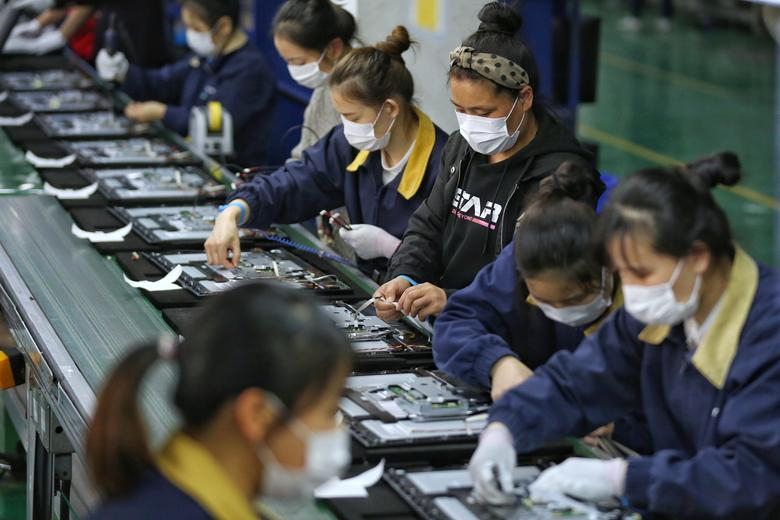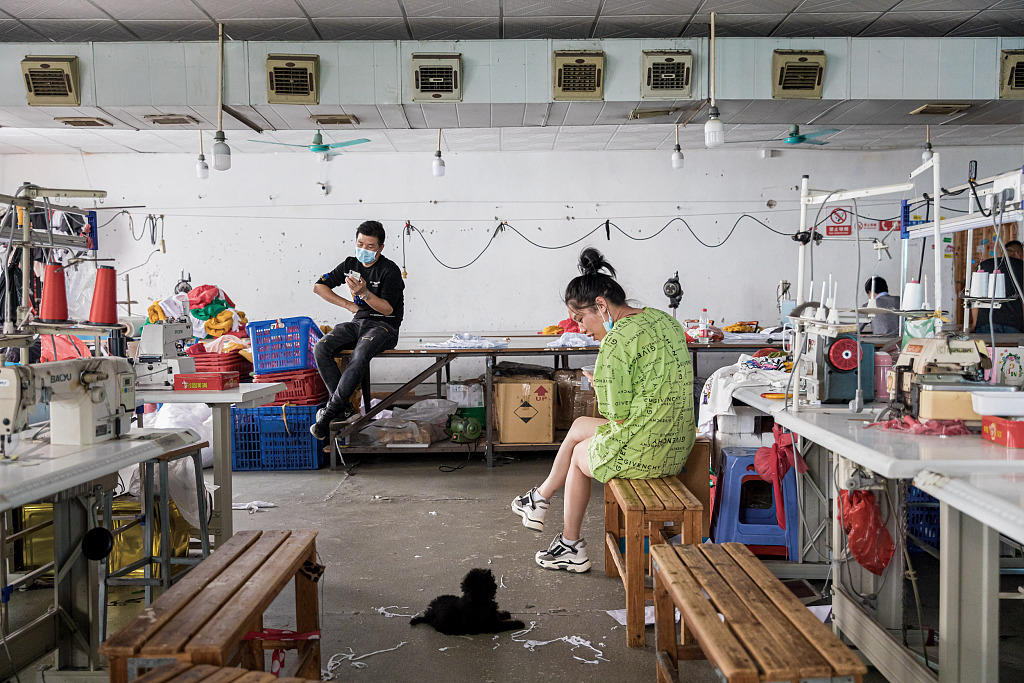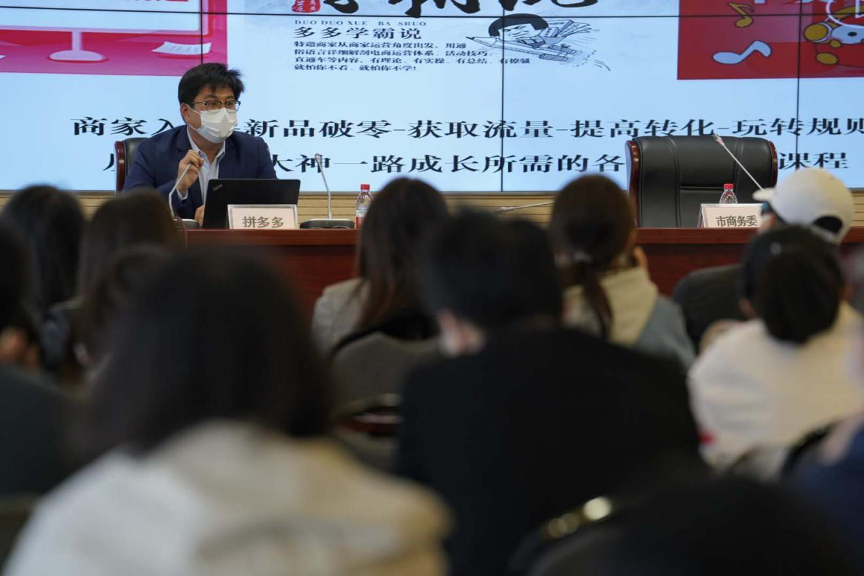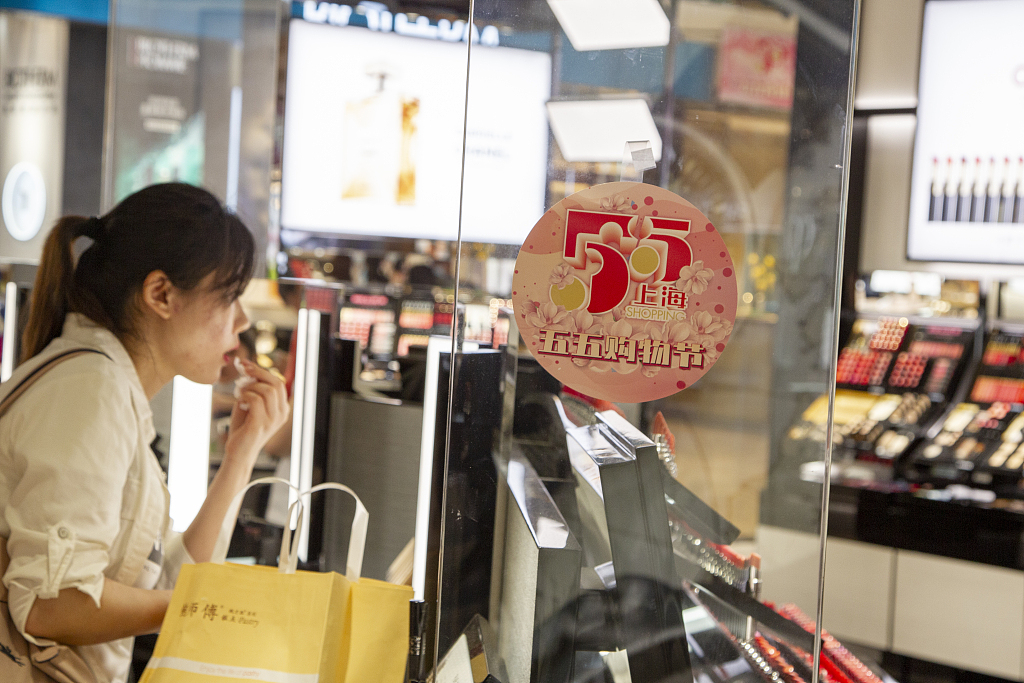After months of shutdown, factories in China have gradually reopened and workers have returned to factory floors. The rhythmic sounds of machinery are once again heard. But one problem persists: there are few orders coming in.
As coronavirus spreads around the world, requests to cancel orders or delay shipments have flooded in, said Ren Mingxing, founder of Shanghai Meidu Textile Production Company, one of the largest manufacturers in China of customized sportswear for major international brands.
About 95 percent of the company's manufactured goods are for exports, said Ren. When coronavirus ravaged countries across the world, he started to receive calls from his U.S. partners and major European clients. The cancellation of orders all took place within one week, and around 30 to 40 percent of the orders are presently on hold.
"I couldn't fall asleep during that week," he said. With money already paid for purchasing raw materials and auxiliary materials – 10 million U.S. dollars on the line – and 1,000 factory workers to support, the pressure is mounting to maintain capital flow. The factory would be left with no work to do by the end of June.

Employees, wearing masks, work on a production line manufacturing display monitors at a factory in Wuhan, Hubei Province, China, April 7, 2020. /Reuters
Employees, wearing masks, work on a production line manufacturing display monitors at a factory in Wuhan, Hubei Province, China, April 7, 2020. /Reuters
Ren's company is one of hundreds of thousands of companies in China that make the country the "world's factory." They produce goods destined for foreign markets at a large scale and low price. But they do not get to export the goods with their own logos. Most of the time, they manufacture products according to the designs and specifications of foreign brands.
For such export-oriented factories in China, the problems increased gradually. Initially, it was the factory shutdown. Then many found it hard to have enough manpower to complete orders from foreign clients. As the country opened up, delay in raw material supply and disruption in logistics stalled the speed at which business resumed.
According to China's National Bureau of Statistics, the official Purchasing Manager Index (PMI) in February hit a record low of 35.7, below the 50-point mark that separates contraction from growth. And as the economy reopened, that figure rebounded to 52 in March and came in at 50.8 in April.
In a note to the analysis of the PMI readings in February, the National Bureau of Statistics said the figure indicates that the recovery in demand is still weak compared with that of production. Among 21 industries surveyed, 15 sectors reported a shortage of orders, including textile, apparel manufacturing and chemical material production.

Workers sitting idly at an apparel factory in Guangdong Province, China, March 27, 2020. /VCG
Workers sitting idly at an apparel factory in Guangdong Province, China, March 27, 2020. /VCG
Even when orders are available, there are risks that payment would be hard to collect, said Fan Yong, manager at a textile production company in Beijing. After the coronavirus dampened overseas demand, some of his foreign clients cited force majeure – an event or effect that cannot be anticipated or controlled – as reason why they cannot meet their payment obligation.
Amid order cancellations from foreign clients, some exporters have shifted to the domestic market.
Among those searching for a new way out is Tangshan Chenyang Sports Equipment, a manufacturer of folding chairs, sports equipment and bike parts to major international retailers. After losing 70 percent of orders from its U.S. and French clients, it decided to focus on selling bike parts to Chinese bike-sharing companies.
But shifting to the domestic market is no easy task, said Chen Qiang, general manager at the company. In the past, the company was only in charge of manufacturing. Sales, promotion as well as customer support were all taken care of by its foreign clients.
"But if you are selling to the domestic market, you need to have your own brand, supported by strong research and development capacity," he said.

A training is hosted by Pinduoduo for export companies in consideration of launching e-commerce business, April 22, 2020. /Pinduoduo
A training is hosted by Pinduoduo for export companies in consideration of launching e-commerce business, April 22, 2020. /Pinduoduo
For export-oriented manufacturers, it means a completely new way of doing business and climbing up the value chain. Even before the coronavirus hit, there was strong push in China to embrace more high-tech manufacturing and cultivate brand recognition. But to understand a new market takes time, and trial-and-error is a luxury at the time when there is not enough cash on the line.
"It takes a few years and a lot of money to train our employees to understand how marketing works for domestic consumers, thus we decide to work with e-commerce platforms to make up for the expertise gap," said Ren Mingxing, founder of Shanghai Meidu Textile Production.
The company joined a training on e-commerce hosted by China's e-commerce platform Pinduoduo as part of the Shanghai municipal government's efforts to help exporters alleviate the pain of declining revenue.
At a press conference, Hua Yuan, director of Shanghai Municipal Commission of Commerce, said the government had reached out to thousands of exporters and offered to connect them with e-commerce platforms to promote sales in domestic market.
A shopping festival is also hosted in Shanghai that spans the entire second quarter to boost consumer spending. Subsidies and help will be provided to major export companies which first tried their hands at e-commerce platforms in China, according to Da Da, Pinduoduo's co-founder. The company vows to offer 1.5 billion yuan in discounts for shoppers covering 10,000 Shanghai brands and companies.

A consumer tries out a lipstick at a promotional event during Shanghai's shopping festival, May 2, 2020. /VCG
A consumer tries out a lipstick at a promotional event during Shanghai's shopping festival, May 2, 2020. /VCG
"For domestic consumers, this means that the only thing they miss out on is the logo of a major international brand, but the quality of the product stays the same," said Ren, talking about the differences his company's shift to domestic market will bring. The first day the company opened up an online store on an e-commerce platform, orders for jerseys started to come in.
As the spending and level of sophistication of the Chinese consumers grow, the experience of export-oriented companies in collaborating with major international brands will play to their advantage in serving the domestic market, said Chen from Tangshan Chenyang Sports Equipment.
Nonetheless, there are fears that exporters might not be able to withstand the price war in domestic market, he added. Because foreign clients often have large demand for a single type of product, the per capita cost of production for foreign clients is low compared with the price in serving domestic consumers.
But to increase profit is the long-term goal. "The priority for now is to have some operation so that the workers will have incentive to stay," he said. For exporters in China, this is only the start to navigate the untapped market potential at home.